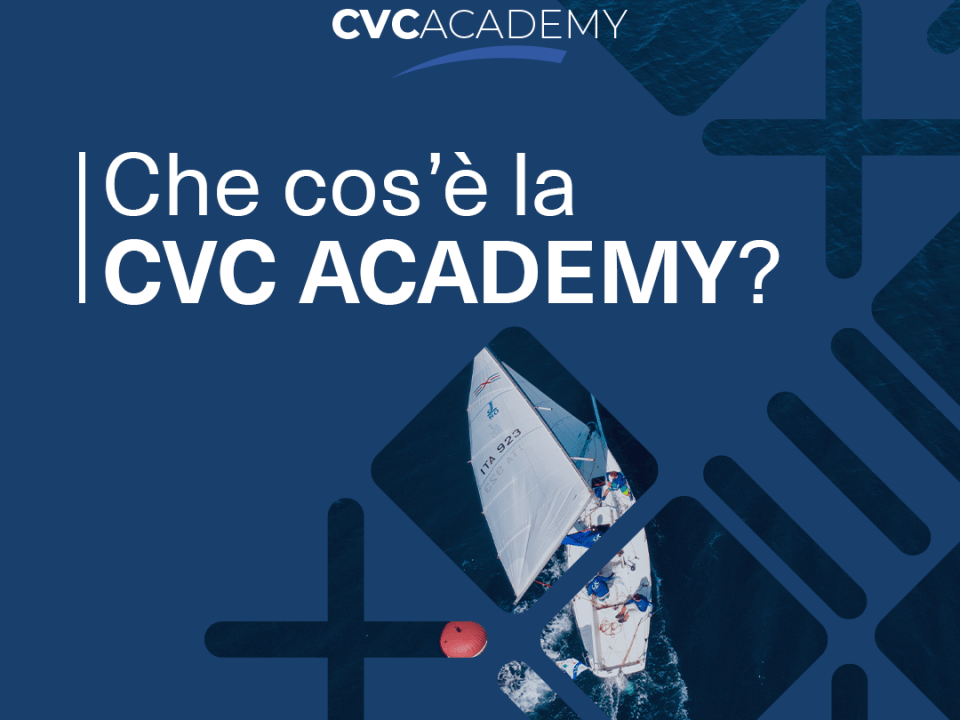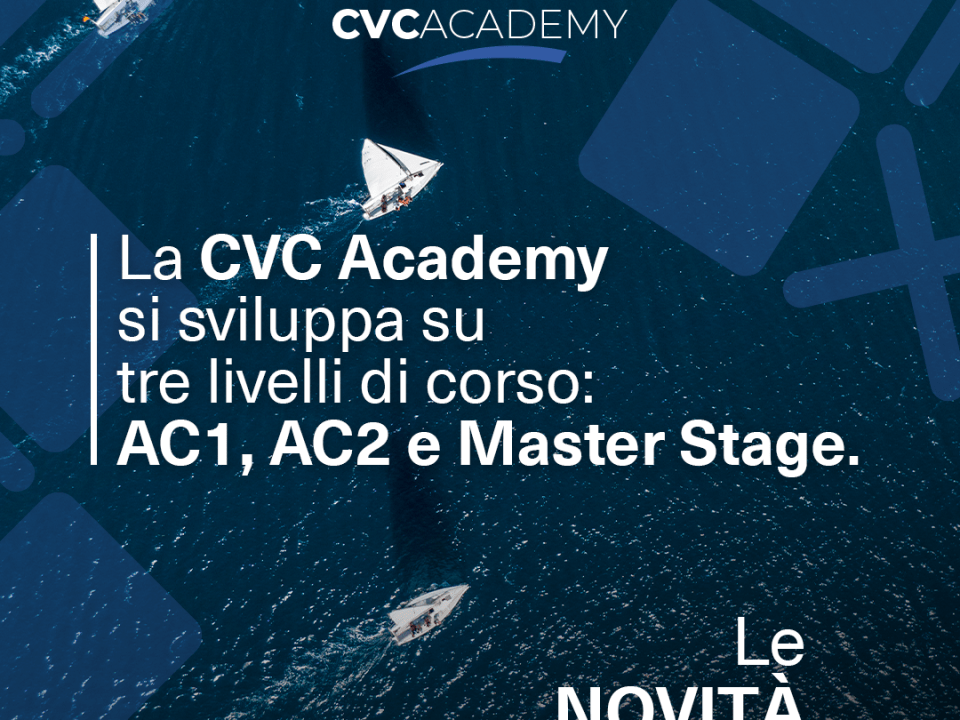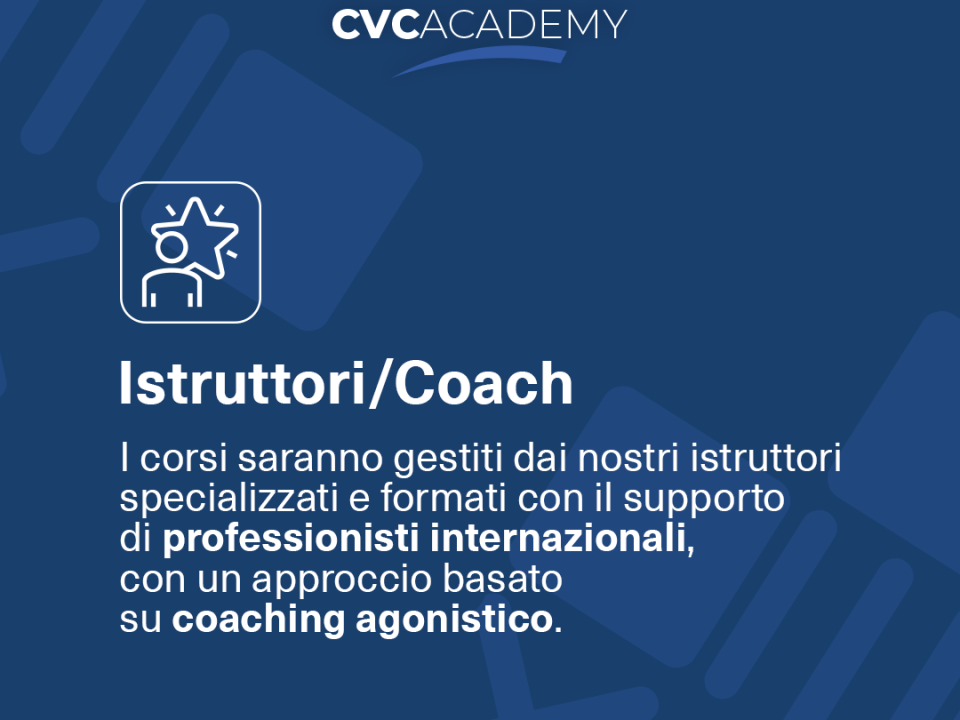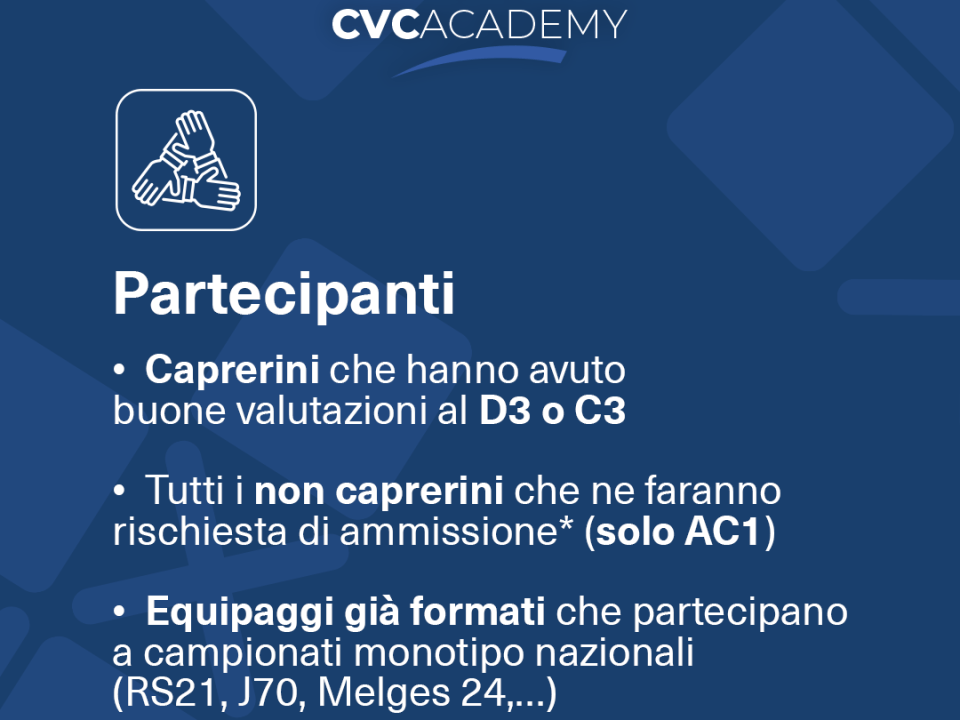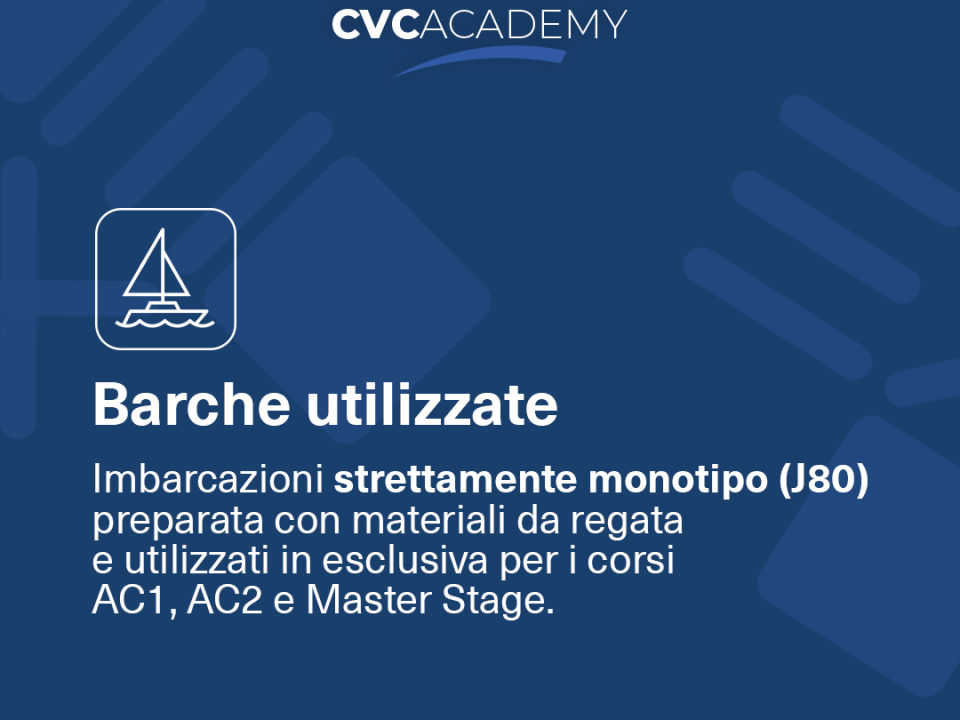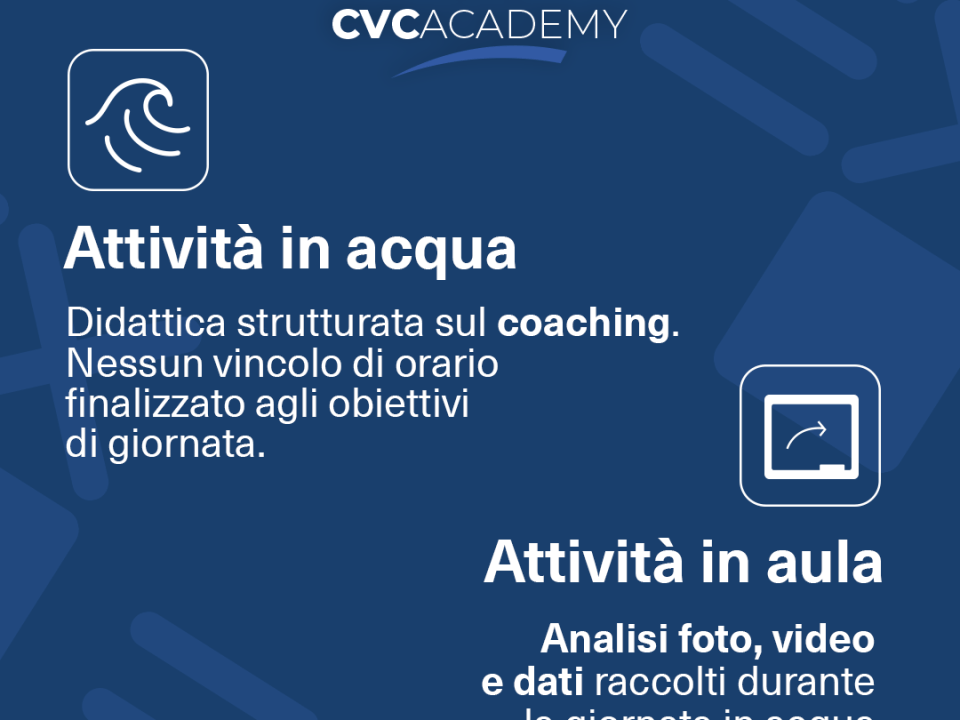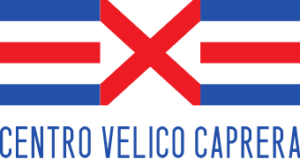Who is the second-level CVC ACADEMY (AC2) course intended for?
To those who have already acquired the technical skills of handling racing maneuvers and sail trim and want to learn fleet racing strategies and tactics. The course requires physical fitness suitable for even demanding sporting activity.What are the minimum admission requirements?
- for those who have already taken courses at the Caprera Sailing Center: having passed the AC1 course by obtaining the proposal for the AC2 course
- for those who have not yet taken courses at the Caprera Sailing Center: have gained and be able to document significant experience in one-design racing
The course syllabus
- Review and in-depth study of topics covered in AC1 course (maneuvers and adjustments) according to roles and crews with video support and in-water coaching
- Review of regatta safety maneuvers (quick-stop with white sails and with Gennaker)
- In-depth look at preparing the boat for racing and adjusting the mast
- Analysis of roles on board and criteria for crew formation, communication in racing, trim management in various gaits
- Deepening of a role based on skills and physical characteristics for maximizing overall crew performance
- Hints on the drivers of performance: technique, training, communication, concentration, anticipation, planning, management of crew briefs and de-briefs, leadership on board
- Notes on weather applied to racing: overview, synoptic analysis, local weather analysis, orography and field
- Field and path analysis
- Race strategy definition, in-depth analysis of tactical options in different situations on the water, target speed and onboard electronics
- Optimization of wave and gust management, optimization of departures based on strategy, optimization of tacking based on strategy and tactics
- In-depth study of fleet racing regulations, in-depth study of protest management
Teaching aids
- Boats: J80
- One coach per crew, embarked only on the first day or as needed
- Regattas and in-water exercises to support the program
- Electronic compass
- Path analysis
- Films to support teaching
- from week 24 to week 31 no alcohol will be sold at the Punta Coda shop.
- Admission to the course is also open to crews of boats racing in national circuits of FIV-recognized classes
Useful information | Offers and discounts | Suggested equipment | Courseware
It should be noted, and the student at the time of enrollment declares to take note of this, that the document "release" for the use of photo / audio / video footage must be sent in the manner specified in the registration form, no later than 15 days before attending the course, taking the enrolled note that if not sent, he/she will not be allowed to attend the course and will not be entitled to any refund of the amounts previously paid for any reason
Useful information
Within one month (30 days) before the start of the course it is necessary that:
- Upload to your CVC account a medical certificate (for at least non-competitive activity) in pdf format (you can use our form found here
Without a certificate you are not admitted to the courses (we remind Milanese that we have an agreement with Medici In Famiglia on non-competitive medical certificates, all details here. - Upload the duly signed "release form" to your account. Failure to do so will result in exclusion from the courses:
– form for minors: ITA – ENG;
– form for adults: ITA – ENG; - Upload double-sided copy in single file of one of your ID documents
- If this is your first course at CVC, or if you have not yet taken it, you must also upload a passport-size photograph of yourself.
- Fill in your master data in your account: menu "personal data."
For luggage, use soft bags that take up little space when folded (no hard suitcases). Remember that cigarettes and tobacco are not for sale at the base.
For all courses:
- sleeping bag (or sheet + blanket)
- sailor's knife (*) needed in the boat for safety and ashore as a perch (see photo below)
- boat shoes and also boat boots for cabin cruiser courses
- 2-3 linen changes
- 2-3 changes of sports socks
- casual short and long pants
- Lightweight long-sleeved shirts and hats to avoid sunburn (light colors recommended)
- Wool sweaters/fleece (at least 2) to cope with the cold weather present at sea even in the summer months
- personal hygiene items* and towels
- hair dryer
- battery-powered flashlight*
- sunglasses
- sailing gloves*
- sunscreens
- water bottle or thermal bottle
- a pair of closed shoes is required for ground activities (the command).
Particularly for courses on dinghies:
- lightweight long-sleeved or short-sleeved T-shirts made of lycra
- spray jacket top
- Neoprene wetsuit*, essential in spring and fall, also recommended in summer
- Tall sailing shoes with socks (to protect feet from straps) or, better, neoprene socks*. For D3, D4, D5 and Foil courses, knee pads may be useful.
Particularly for courses on cabin cruisers:
- Sailing oilskin (*) light or heavy depending on the season
- Boat shoes with suitable soles (no Superga or similar, they slip), boots in cooler months
* items that can be purchased at the Caprera commissary
From the mainland > Olbia
By ship (arrival in Olbia or Golfo Aranci)
- with TIRRENIA, MOBYLINES or GRIMALDI, departing from Genoa, Livorno (the night before) or other ports and arriving in Olbia. For information on current Conventions send an email to the secretary's office.
- with SARDINIA FERRIES with departure from Livorno (the night before) and arrival in Golfo Aranci.
etc...
By air (arrival in Olbia)
- AEROITALIA, EASYJET, VOLOTEA or other companies, with departures from major Italian and foreign cities
Olbia > Palau
Palau is 50 km from Olbia, these are the means of transportation (route duration about 1 hour):
- From Olbia port (maritime station), regular ARST bus . Price about 3 Euro
- from Olbia center (bus station), regular ARST buses with departures every hour
- From Olbia airport:
- bus services every hour to Olbia center
- TURMOTRAVEL (0789/21487) runs a direct service from Olbia airport to Palau-see schedule: https://gruppoturmotravel.com/linee-extraurbane
- Aisoni cab service, with which CVC has an agreement:- Place in cumulative transfer € 20.00 including VAT per person each way
- Car 1/3 seats + our driver €. 90.00 including VAT
- Van 4/8 seats + our driver €. 140.00 including VAT
- Overnight surcharge (9:00 p.m. to 6:00 a.m.) 20%.
Reservations at 348/7988280
Mr. Fabrizio Aisoni will send the most suitable means (cab, minibus) according to the number of reservations.
Palau > La Maddalena
Palau to La Maddalena scheduled ferry (about 15 minutes) - ticket at ticket office before boarding.
La Maddalena > Caprera Base
Every Saturday in La Maddalena 1:45 p.m., on the Waterfront via Amendola, motorboat Apollo II departure with a CVC sign will transport students to Caprera (meet 10/15 minutes before). Before May 1 and after October 31, the motorboat will be replaced by bus, same time and meeting point.
Phone to be used only on Saturday of arrival in case of emergency: 347/6749599.
If you arrive late, from La Maddalena you can call a cab (see contact details among Useful Phones - average price 30/40 Euro or more).
The Centro Velico Caprera does not organize group trips but points out the existence of a Facebook Page dedicated to arrivals and departures so that participants can make the best travel arrangements.
By car it is not recommended to get to the Base
Access is allowed only as far as the gate to the Precruise dock, from there you wait for other students to arrive by ferry from La Maddalena. For the duration of the course you will have no opportunity to use it. For those arriving by car it is recommended to leave it in Palau.
The base has 3 settlements on the south coast of the island:
- Punta Coda where drift initiation courses usually stay (separate women's and men's dorms)
- Perfection, where they usually house other drift or cabin cruisers (mixed huts)
- Pre-cruise, where the Cabin courses (mixed huts) usually stay.
Punta Coda has a CVC infirmary.
Upon disembarkation from the ferry, students from each course are assembled and assigned their places in the dormitories. You will take possession of your berth, dressed appropriately for the swimming and sculling test (drift initiation courses) or for the activity on the boats. You will then be assembled in the classroom to receive instruction from the Chief of Instructors (Shift Leader) and base staff.
There are individual safety boxes in the Punta Coda Initiation settlement. You will be given a key upon deposit of 50 Euro. In the other settlements there are collective safes. The School is not liable for theft of items left unattended. Avoid bringing valuables or excessive amounts of money.
Schedules
Life on Caprera is governed by the following schedules :
06.30 wake up
07.00 breakfast
07.45 lecture
09.00 embarkation
12.30 disembarkation
13.00 lunch
13.45 lecture
14.30 embarkation
18.30 disembarkation
20.00 dinner
21.00 comments on the day
22.30 silence
Particular attention is recommended to rest at night: in fact, very intense sports activity does not allow hours of rest to be lost.
- The CVC Foundation - Centro Velico Caprera ETS Centro Velico Caprera is a sailing and sea school, not a vacation center: attendance at courses requires commitment, discipline, spirit of adaptation and acceptance of behavioral norms, as well as the evaluations made by the School itself with regard to the suitability of each student to attend the required courses. The same attendance requires, in addition, adequate mental, physical and health conditions, as certified by the attending physician.
It is acknowledged that the actions of the CVC Foundation are guided by the following principles and that attendance at its courses requires timely compliance with them: respect for the person, understood as the equal right and value of the individual without distinction of creed, gender or social condition; respect for and protection of the environment in particular the habitat surrounding our center; solidarity aimed at cooperation and mutual support among individuals, generating a sense of belonging to a large supportive community, as better specified in the Charter of Values and Code of Ethics to which reference is made and which must be respected. - Access to the Bases is restricted only to those who are teachers or students in an ongoing course. No cars (which must remain outside the gate) or motorcycles, or dogs or other animals are allowed. Allocation of each course to one of the CVC Bases is at the discretion of the CVC itself, by virtue of non-discussable reasons of an organizational and safety nature for participants. Arrivals and departures must take place strictly according to the scheduled dates and times (use of collective means is recommended). No responsibility is assumed by the Center with reference to travel to and from the Caprera base.
- Absence, even temporarily, from the Base is not permitted except for justified reasons and with the permission of the Base Chief. Visits from relatives or friends are not allowed unless expressly authorized by the Base Chief.
- Tidiness and cleanliness, which are essential in a community life, cover not only one's person and personal belongings, but also the dormitories, common rooms and facilities, the surroundings, and the equipment and facilities on the Base.
Vital to the School is the care of the vessels and materials. - Sleeping after a busy and tiring day is a sacred right, so all noise in the vicinity of dormitories must cease at quiet time. Baby radios, iPods or the like are not welcome and their use is prohibited in common rooms. Cell phones are also to be used discreetly, and they are to be turned off during communal activities in any case.
- In courses with dormitory housing, students may not attend dormitories reserved for female students and vice versa.
- Safety is a dominant theme in education both at sea and on land: from the obligation to wear a life jacket and, where provided, a protective helmet, to rescue and firefighting equipment. Everyone contributes to the work of prevention, to avoid damage to people and equipment. The obligation to observe the rules dictated by current regulations and the directives issued remains in place.
- The Base Chief has the authority to remove from the Base any student who proves to be unfit for the community life of the school or who has been guilty of serious misconduct, including with regard to the principles and values set forth in Section 1 above.
- Use of the boats is permitted for the School's institutional activities. Any other use must be authorized by the Base Chief.
- The CVC reserves the right to take any measures, including sanitary measures, that it deems appropriate or necessary, in compliance with or as a result of legislative and/or regulatory provisions to gain access to the base and to attend courses.
- The regulations referred to in the preceding points are intended to be subject to national and regional regulations on measures, including behavioral and individual protection measures, aimed at countering the spread of COVID-19, as well as those set forth in the document "Behavioral Standards Emergency Covid" that can be consulted AT THIS LINK, to be considered a substantial part of these Living Standards.
In addition to personal telephones, to get in touch with students, from May to October, you can call the Secretariat in La Maddalena (tel. 0789/738529). Cell phones are not allowed to be used on the boat or during lessons ashore. Their use is allowed only during free moments.
All trainees participate in communal activities (distributing meals, cleaning the mess, dormitories and facilities, helping in the sail room and on the dinghies). This will help to acquire the mindset of living together on a boat where the whole crew contributes to the activities on board. For one day, in the weekly courses, or two days, in the fortnightly courses, each student is employed in the "command".
The CVC commissary is at Punta Coda and Precruise and is open daily (including Sundays). Hours: Punta Coda 12:30-1 p.m. 6:45-8 p.m. (Saturday 10:30 a.m.-1 p.m.). Pre-cruise: 6:45-8 p.m. (Saturday 9:30-11 a.m.). At the commissary you can pay with cash, ATM or credit cards.
At the commissary you can find:
- Technical leaders for sailing:
- windbreakers;
- sailing gloves;
- wetsuit boots;
- neoprene wetsuits;
- sailing pants;
- boots (on request).
- Sailing clothing:
- polo shirts, sweaters;
- shoes (on request).
- Miscellaneous accessories: blankets, sleeping bags, No cigarettes for sale.
- You can also find:
- drinks, cookies, snacks, ;
- hygiene items
If there are special needs (medicine, etc.), the commissary clerk can purchase the necessities from time to time in La Maddalena.
From week 23 to week 31 no alcohol will be sold at the Punta Coda commissary.
Coke, beer, wine and other beverages can be purchased through the staff at the commissary. Water at the table and in the boat is provided free of charge.
For personal use, you can always refill your own water bottles from the dispensers provided at the bases.
The CVC is organized to follow the diet of people with celiac disease or severe food allergies (reported to the Secretariat before the start of the course).
In the case of food preferences, on the other hand, there may not be a dedicated meal, but one may choose the food genre, from those available, compatible with the intolerance as long as it is promptly reported and documented at the time of registration.
It is recommended to bring your personal ASL card. There is an infirmary on Caprera.
In case it is necessary to transfer to a hospital in La Maddalena or Olbia, the student will have to pay for the means to return to the Base.
The last morning of your stay in Caprera is devoted to tidying up the boats, sails, dormitories and the last bureaucratic formalities, including filling out the QUESTIONNAIRE where you can express your liking for the school's activities and suggestions for improving them: we value your opinion! After filling out the questionnaire, you will need to pack your bags.
Students are brought back to La Maddalena around noon by motorboat (before May 1 and after October 31 the motorboat will be replaced by a bus). From La Maddalena you can take a ferry to Palau and from Palau the regular bus to Olbia. We recommend booking a flight or ferry departing from Olbia from 6 p.m. onward.
ARST and TURMOTRAVEL Schedules: Olbia-Palau-Olbia
- ARST: see https://www.arst.sardegna.it/servizi-orari/servizi-extraurbani/ or call 351/8374226 or 070/26571
- TURMOTRAVEL: see https://trasportopubblico.gruppoturmotravel.com/ hourlyxtraurbans or call 0789/21487
Milan Secretariat 02/86452191
La Maddalena Secretariat 0789/738529
La Maddalena Hospital 0789/737732
Taxi Aisoni (Olbia/Palau) (also for minibuses) 348/7988280
Cab Acciaro (also for minibuses of 6) 340/1554000
Taxi Musa Roberto (also for minibuses) 347/3706074
Taxi Meo Giuseppe 340/3616466 (cabs and minivans)
Taxi in Palau: Roberto 347/7520270 - Car 4 pax 80.00 minibus 8 pax 100.00 (to be verified)
Phone to call only on Saturday of arrival in case of emergency: 347/6749599
If you already have a product in your basket, complete your transaction or empty your basket using the icon in the top right-hand menu before making a new purchase.

